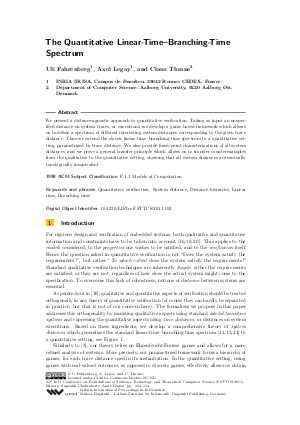The Quantitative Linear-Time--Branching-Time Spectrum
Authors Uli Fahrenberg, Axel Legay, Claus Thrane
-
Part of:
Volume:
IARCS Annual Conference on Foundations of Software Technology and Theoretical Computer Science (FSTTCS 2011)
Part of: Series: Leibniz International Proceedings in Informatics (LIPIcs)
Part of: Conference: IARCS Annual Conference on Foundations of Software Technology and Theoretical Computer Science (FSTTCS) - License:
 Creative Commons Attribution-NonCommercial-NoDerivs 3.0 Unported license
Creative Commons Attribution-NonCommercial-NoDerivs 3.0 Unported license
- Publication Date: 2011-12-01
File

PDF
LIPIcs.FSTTCS.2011.103.pdf
- Filesize: 413 kB
- 12 pages
Document Identifiers
Subject Classification
Keywords
- Quantitative verification
- System distance
- Distance hierarchy
- Linear time
- Branching time
Metrics
- Access Statistics
-
Total Accesses (updated on a weekly basis)
0PDF Downloads0Metadata Views
Abstract
We present a distance-agnostic approach to quantitative verification. Taking as input an unspecified distance on system traces, or executions, we develop a game-based framework which allows us to define a spectrum of different interesting system distances corresponding to the given trace distance. Thus we extend the classic linear-time--branching-time spectrum to a quantitative setting, parametrized by trace distance. We also provide fixed-point characterizations of all system distances, and we prove a general transfer principle which allows us to transfer counterexamples from the qualitative to the quantitative setting,showing that all system distances are mutually topologically inequivalent.
Cite As Get BibTex
Uli Fahrenberg, Axel Legay, and Claus Thrane. The Quantitative Linear-Time--Branching-Time Spectrum. In IARCS Annual Conference on Foundations of Software Technology and Theoretical Computer Science (FSTTCS 2011). Leibniz International Proceedings in Informatics (LIPIcs), Volume 13, pp. 103-114, Schloss Dagstuhl – Leibniz-Zentrum für Informatik (2011)
https://doi.org/10.4230/LIPIcs.FSTTCS.2011.103
BibTex
@InProceedings{fahrenberg_et_al:LIPIcs.FSTTCS.2011.103,
author = {Fahrenberg, Uli and Legay, Axel and Thrane, Claus},
title = {{The Quantitative Linear-Time--Branching-Time Spectrum}},
booktitle = {IARCS Annual Conference on Foundations of Software Technology and Theoretical Computer Science (FSTTCS 2011)},
pages = {103--114},
series = {Leibniz International Proceedings in Informatics (LIPIcs)},
ISBN = {978-3-939897-34-7},
ISSN = {1868-8969},
year = {2011},
volume = {13},
editor = {Chakraborty, Supratik and Kumar, Amit},
publisher = {Schloss Dagstuhl -- Leibniz-Zentrum f{\"u}r Informatik},
address = {Dagstuhl, Germany},
URL = {https://drops.dagstuhl.de/entities/document/10.4230/LIPIcs.FSTTCS.2011.103},
URN = {urn:nbn:de:0030-drops-33324},
doi = {10.4230/LIPIcs.FSTTCS.2011.103},
annote = {Keywords: Quantitative verification, System distance, Distance hierarchy, Linear time, Branching time}
}
